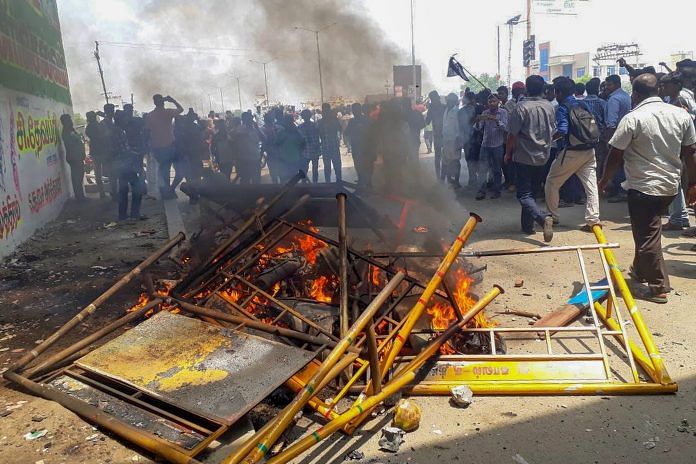Never has Tamil Nadu seen such violence unleashed upon its people. With Tuticorin, the Palaniswami government has destroyed its mandate to govern.
If the visuals of Marina protests in Tamil Nadu last year made people anxious about their government, today, people are aghast at the brutal firing of at least 11 Tuticorin protestors by trigger-happy policemen.
The state of Tamil Nadu has been in “dissent mode” since 2009. But, the Tuticorin incident may not fade away like other protests. People have witnessed Tamil Nadu’s decline on social and economic indices. Jobs have dried up. Industries have left the state. But, never has the state seen such violence unleashed upon its people.
With the Tuticorin incident, the Edappadi Palaniswami government has exterminated its mandate to govern. There is a serious concern that the AIADMK government will do anything to not weaken its present position.
Land of Protests
Since 2009, Tamil Nadu has witnessed more protests than anywhere else in the country. The spectrum of protests have been wide — Sri Lankan Civil War, anti-National Eligibility and Entrance Test, pro-Jallikattu, pro-farm loan waiver, Cauvery water sharing and so on — but more than few have been concerning environmental issues. Some of the longest protests were held in Idinthakarai, a coastal village, against the expansion of nuclear power plants in Kudankulam. Others have been held against coal-bed methane projects, hydrocarbon projects, neutrino scheme, and expansion of Sterlite Copper plant.
After Jallikattu protests which swept the second longest beach in the world, the Tamil Nadu government has routinely imposed Section 144 orders on Marina Beach. On any day in the last year, police jeeps and armed personnel have outnumbered beach-goers and children at the Marina. Such has been the paranoia against protests and protesters.
It would be fair to say that the present AIADMK government has had a poor track record of dealing with dissent. Even during the height of the Kudankulam protests, then Chief Minister Jayalalithaa carried out an impressive policy u-turn and went back completely on her promise to the protesters. The successor AIADMK government under O Panneerselvam was caught on the wrong foot with the Jallikattu protests that took over the state in January 2017. At the fag end of the protests, then Chief Minister Panneerselvam had to dig into his right-wing playbook when he proclaimed that the Jallikattu protests had been infiltrated by “anti-national elements”.
Pressure from Centre?
Largely viewed as incompetent, inexperienced and uncharismatic, the present AIADMK Chief Minister E Palaniswami has been facing tremendous pressure from the Central government. There is an Income Tax investigation into the distribution of bribes for voters in March 2017 where the chief minister and members of his council are persons of interest. Another investigation into taking bribes from a Gutkha manufacturer has brought the health minister, and the present director general of police under scanner. The investigation was transferred to the Central Bureau of Investigation by the Madras High Court last month. It would be an understatement to say that the Government of Tamil Nadu is beholden to the Government of India.
There is also a real possibility that the present chief minister does not enjoy the confidence of the Legislative Assembly, and that his government has survived because cases connected to the floor test are pending before the Madras High Court. This government is running scared from investigating agencies and courts of law.
It was against this background that a strong protest grew in and around Tuticorin against the expansion of the Sterlite plant. During the course of 100 days, the government neither sent a representative to meet the protesters nor did it invite the protesters to discuss their grievances with the chief minister. On the 100th day, a peaceful rally was dispersed using automatic weapons and armed snipers. So far, the Tamil Nadu governor has claimed that 11 persons have died whereas the chief minister’s statement only names nine.
There has been no clarity on who issued the shooting orders and why the police manual in dealing with protests was not followed. The government has hurriedly appointed an Inquiry Commission headed by a retired Judge of the Madras High Court. It is worth pointing out that similar Inquiry Commissions looking into Jallikattu protests (under Justice Rajeswaran) and death of Jayalalithaa (under Justice Arumugasamy) are yet to provide any closure into these matters.
Manuraj Shunmugasundaram is an advocate and DMK spokesperson.



